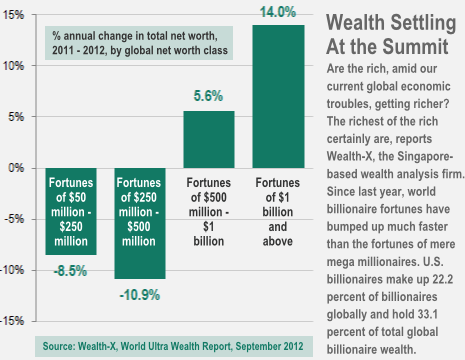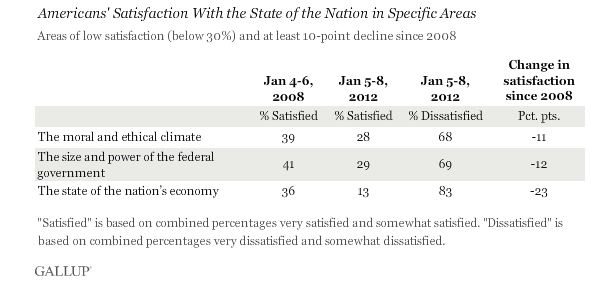Too Much: Chronicles of Inequality [Oct. 8, 2012]
 |
October 8, 2012 |
| THIS WEEK ||| Don’t forget to get the WORLD ULTRA WEALTH REPORT | |
| Lots of groups in America these days are watching how individual members of Congress go about their business. Environmentalists and retailers keep congressional report cards. So do farmers and civil libertarians. Even poker players are keeping tabs on Congress.All these groups, of course, have their own specific concerns. They’re not looking at the “big picture,” the inequality that has become the central issue of our time. Voters have simply had no one rating lawmakers on what they’re doing — and failing to do — to narrow the gap between our rich and everyone else.That has just changed, with two new “big picture” report cards. The Campaign for America’s Future rating offers a middle class focus. The Institute for Policy Studies appraisal grades what lawmakers have done “to make sure that all Americans, not just a privileged few, share in the wealth we all together create.”Included in the IPS report card: an online interactive map that lets voters identify — and spread the word about — lawmakers who cater to our top 1 percent. That catering has to end. In this week’s Too Much, still more reasons why. | About Too Much, a project of the Institute for Policy StudiesProgram on Inequality and the Common GoodSubscribe to Too MuchInequality.orgJoin us on Facebook or follow us on Twitter |
| GREED AT A GLANCE | |
The closest friends of America’s top 1 percent in Congress — the 59 lawmakers who rate “F” in the new Institute for Policy Studies inequality report card — love to claim that the less the rich pay in taxes, the more they’ll invest and grow the economy. The Congressional Research Service, the nonpartisan research arm of Congress, has just put that claim to the test. The CRS has crunched data for the years since 1945 and found no correlation between lower taxes on high incomes and economic growth. What do tax cuts for the rich generate? More inequality. In 1945, income over $200,000 faced a tax rate over 90 percent. The nation’s top 0.1 percent took home that year 4.2 percent of national income. In 2007, the top tax rate stood at 35 percent. The top 0.1 percent income share: 12.3 percent . . . Mitch Marrow knows stress. He used to play pro football and then spent over a decade in the hedge fund industry, helping people of means. Now he’s helping their dogs — as the CEO of Manhattan’s choicest “full-service dog concierge.” The Spot Experience, his company, offers affluents the ultimate in doggie daycare, a “stress-free,” no-bark environment where trainers, handlers, and groomers obsess over the emotional well-being of the pooches in their charge. A month of doggie day care at Spot’s four Manhattan locales routinely runs over $1,000, not counting the gourmet treats that can set dog owners back $30 a 16-ounce bag. Spot patrons seldom blink at price-tags. Notes CEO Marrow: “The kind of clients who live in luxury residential buildings have disposable incomes, and they’re willing to pay a premium to feel at ease.”Europe’s biggest annual car extravaganza, the Paris Auto Show, has only a week more to go. The big news? Electric cars have gone ritz. With sales of mainstream electrics lagging worldwide, notes auto analyst Michael Vaughan, car makers are increasingly tying electric motoring’s future to the global deep pockets who’ve thrived through the worst of the global economic crisis. Mercedes-Benz is pitching its new $525,000 SLS AMG Coupe as the “most exclusive and dynamic way to drive an electric car.” The clean machine, complete with gull-wing doors, will debut in 2013. The vehicle’s anticipated top speed: 155 mph. Mitch Marrow knows stress. He used to play pro football and then spent over a decade in the hedge fund industry, helping people of means. Now he’s helping their dogs — as the CEO of Manhattan’s choicest “full-service dog concierge.” The Spot Experience, his company, offers affluents the ultimate in doggie daycare, a “stress-free,” no-bark environment where trainers, handlers, and groomers obsess over the emotional well-being of the pooches in their charge. A month of doggie day care at Spot’s four Manhattan locales routinely runs over $1,000, not counting the gourmet treats that can set dog owners back $30 a 16-ounce bag. Spot patrons seldom blink at price-tags. Notes CEO Marrow: “The kind of clients who live in luxury residential buildings have disposable incomes, and they’re willing to pay a premium to feel at ease.”Europe’s biggest annual car extravaganza, the Paris Auto Show, has only a week more to go. The big news? Electric cars have gone ritz. With sales of mainstream electrics lagging worldwide, notes auto analyst Michael Vaughan, car makers are increasingly tying electric motoring’s future to the global deep pockets who’ve thrived through the worst of the global economic crisis. Mercedes-Benz is pitching its new $525,000 SLS AMG Coupe as the “most exclusive and dynamic way to drive an electric car.” The clean machine, complete with gull-wing doors, will debut in 2013. The vehicle’s anticipated top speed: 155 mph. |
Quote of the Week“Not mentioning inequality when talking about the plight of the middle class is like not mentioning poaching when discussing the future of elephants.” David Callahan on last week’s first presidential debate, What About Inequality? Demos Policy Shop, October 4, 2012 |
| PETULANT PLUTOCRAT OF THE WEEK | |
 America’s billionaires seem to be feeling a bit beleaguered these days. The most beleaguered of all? That may be Lee Cooperman, the Goldman Sachs partner turned hedge fund kingpin. Cooperman has been widely blasting President Obama for pitting “rich-and-entitled versus poor-and-dispossessed,” an attack that has one fellow billionaire calling the 69-year-old “the pope” of the anti-Obama “movement.” Last October, this week’s New Yorker points out, Cooperman proclaimed that the “anti-wealth” Obama might win this year’s election because of “the 40 or 50 percent of the country on the dole that support him.” Cooperman’s diatribe, notesanalyst Chrystia Freeland, helps fix Mitt Romney’s now infamous “47 percent” spiel before wealthy donors last May as a perspective “widely held by people of Romney’s class.” America’s billionaires seem to be feeling a bit beleaguered these days. The most beleaguered of all? That may be Lee Cooperman, the Goldman Sachs partner turned hedge fund kingpin. Cooperman has been widely blasting President Obama for pitting “rich-and-entitled versus poor-and-dispossessed,” an attack that has one fellow billionaire calling the 69-year-old “the pope” of the anti-Obama “movement.” Last October, this week’s New Yorker points out, Cooperman proclaimed that the “anti-wealth” Obama might win this year’s election because of “the 40 or 50 percent of the country on the dole that support him.” Cooperman’s diatribe, notesanalyst Chrystia Freeland, helps fix Mitt Romney’s now infamous “47 percent” spiel before wealthy donors last May as a perspective “widely held by people of Romney’s class.” |
Like Too Much? Email this issue to a friend |
| PROGRESS AND PROMISE | |
| The six heirs to the Wal-Mart fortune, Nobel Prize-winning economist Joseph Stiglitz observed last week, now hold about $70 billion in wealth, as much as the entire bottom 30 percent of America’s households. These heirs owe that fortune, in large part, to the total absence of collective bargaining within Wal-Mart’s U.S. empire. Is this non-union empire now cracking? A series of walkouts have rocked Wal-Mart since mid September, the first time in Wal-Mart history that workers at multiple outlets have struck at the same time. The strikers have included workersat the retail giant’s largest warehouse. Temperatures in this Illinois facility can reach 120. Says worker Mike Compton: “They want to know why we’re stopping to get a drink of water. All they talk about is CPH, cartons per hour.” | Take Action on InequalityStand with striking Wal-Mart workers. Check out theOURWalmart support site for details how. |
| INEQUALITY BY THE NUMBERS | |
 |
Stat of the WeekThe typical American middle class family would have to work 82,411 years to earn enough to equal the average billionaire fortune on the latest Forbes magazine list of America’s 400 richest.
|
| IN FOCUS | |
| Can We Get Tougher on Crime in the Suites?Federal regulators have actually been cracking down somewhat lately on financial industry fraud. But the power-suited executives responsible for that fraud are still paying no personal price.What should we, as a society, be doing about all those reckless financial industry executives who helped trigger the Great Recession? Should we be putting these execs behind bars? Or should we forgive and forget and let them collect hundreds of millions of dollars in new rewards?These questions now stand answered. The Equilar executive pay data firmreported last week that the five highest-ranking execs at 18 top U.S. financial firms together pocketed — in the worst 12 months after Wall Street’s 2008 meltdown — stock awards now worth nearly half a billion dollars.Meanwhile, not one top financial industry executive has yet seen the inside of a jail cell, despite massive instances of fraud at the firms they’ve been leading.How widespread has this fraud been? The Securities and Exchange Commission, the federal watchdog over Wall Street, has so far “collected $2.2 billion in penalties, disgorgement, and other monetary relief from cases related to the crisis,” the New York Times reports.And that total doesn’t count the $25 billion settlement with banks that the Justice Department announced last February — over fraudulent foreclosure practices — or any of the $536 million in refunds and penalties the new Consumer Financial Protection Bureau has won since July from three major credit card companies.Not one cent of all these millions and billions has come directly out of the pockets of senior financial industry executives. Millions and billions have instead been pouring millions into the pockets of these executives.
Consider Capital One Bank, the “don’t-leave-home-without-it” credit card giant. This past summer, Capital One agreed to pay $210 million in refunds and fines after federal regulators caught bank staff misleading customers on credit scores and falsely claiming that paid add-on services came at no charge. Capital One’s top five execs could pay that $210 million, two times over, just from the pay they pocketed in the one year the new Equilar executive pay analysis has tracked. From mid 2008 to mid 2009, these five Capital One execs gobbled up stock and stock option awards then worth $19.9 million. At the time of that award, Capital One shares were selling at bargain-basement prices. Since then, the entire stock market has rebounded, Capital One shares included. Equilar puts the current value of the $19.9 million in stock and options Cap One’s execs received four years ago at $114 million. The five execs, insists a flack for Capital One, deserve every bit of that reward. They “delivered,” the flack explains, “solid results in 2009.” Solid as smoke and mirrors. The five execs ran a company that bamboozled consumers. They parlayed a huge stock market rebound — fueled by taxpayer-financed bank bailouts — into immense personal windfalls. But let’s not dwell on just Capital One. American Express last week agreed to pay $112.5 million in refunds and fines. The company, regulators found, has been charging illegal fees and reneging on discounts promised to consumers. At the stock market low point in 2009, notes Equilar, American Express generously stuffed the pockets of its top five execs with options then worth a measly $7.6 million. The current value of these options: $91.2 million. All told, between July 1, 2008 and June 30, 2009, the 80 executives at the 18 U.S. financial firms that Equilar examined grabbed stock and options now worth a stunning $457 million. Some of these execs, we now know, ran companies guilty of massive frauds. And why should we expect, asks consumer advocate Dennis Kelleher of Better Markets, anything but widespread fraud out of Wall Street’s finest? “If you are an executive,” he notes, “you know that the chances of getting caught are infinitely small, and the chances of getting caught and prosecuted are even smaller.” On Wall Street and elsewhere in Corporate America, crime clearly pays. Back in the Great Depression, curiously enough, we took a different tack toward Wall Street crime. The nastiest of America’s super-rich wheeler-dealers went to jail. In 1938, for instance, prosecutors sent New York Stock Exchange president Richard Whitney upriver to Sing Sing. Six thousand people gathered at New York’s Grand Central Station to watch armed guards shuffle Whitney onto the prison-bound train. We don’t, of course, do prison trains anymore. But planes would do. Like this article? Subscribe and get Too Much in your email inbox every Monday. |
Email this Too Much issue to a friendNew Wisdom on WealthCatherine Rampell, The Math on the Romney-Ryan Tax Plan, Economix, October 1, 2012. A clear simple debunking of the irregular arithmetic behind the 1 percent-friendly Romney tax proposals.Andrew Fieldhouse, Even more mathematically impossible tax promises,Working Economics, October 4, 2012. A clear detailed debunking of the irregular arithmetic behind the 1 percent-friendly Romney tax proposals.Nicholas Kristof, Why Let the Rich Hoard All the Toys? New York Times, October 4, 2012. inequality should be getting far more attention in this year’s presidential campaign. Here’s why. Jansing & Co., Poor Billionaires? America’s super-rich play victims,NBC News, October 5, 2012. Thomson Reuters editor Chrystia Freeland talks about her new article that highlights America’s most irritable billionaires.
|
| NEW AND NOTABLE | |
Lawrence Mishel, Josh Bivens, ELise Gould, and Heidi ShierhoLz, The State of Working America, 12th edition. Economic Policy Institute, Washington, D.C. How long has the Economic Policy Institute been publishing the State of Working America series? This long: The first biannual edition came out before anyone dreamed that someday researchers might be able to share stats and insights in something called cyberspace. Now, a quarter-century later, a new edition has just appeared. This new State of Working America will be available shortly in book form, from Cornell University Press, but all the book’s data and discussions also now appear online, in easy-to-navigate pages. The basic theme? That hasn’t changed since the first State of Working America in 1988: Rising inequality, notes EPI, is driving intense wage stagnation, and specific 1 percent-friendly public policy choices are driving that inequality. How long has the Economic Policy Institute been publishing the State of Working America series? This long: The first biannual edition came out before anyone dreamed that someday researchers might be able to share stats and insights in something called cyberspace. Now, a quarter-century later, a new edition has just appeared. This new State of Working America will be available shortly in book form, from Cornell University Press, but all the book’s data and discussions also now appear online, in easy-to-navigate pages. The basic theme? That hasn’t changed since the first State of Working America in 1988: Rising inequality, notes EPI, is driving intense wage stagnation, and specific 1 percent-friendly public policy choices are driving that inequality. |
Web GemKoch Cash/ This new sitefrom the International Forum on Globalization zeroes in on the billionaire brothers who have become “the single biggest source of funding to fight collective bargaining, clean air, voters’ rights, and strong social safety nets.” |
| ABOUT TOO MUCH | |
| Too Much, an online weekly publication of the Institute for Policy Studies | 1112 16th Street NW, Suite 600, Washington, DC 20036 | (202) 234-9382 | Editor: Sam Pizzigati. | E-mail: editor@toomuchonline.org | Unsubscribe. | Subscribe to Too MuchForward to a Friend |
Let’s keep this award-winning site going!
| Yes, audiences applaud us. But do you?If yes, then buy us a beer. The wingnuts are falling over each other to make donations…to their causes. We, on the other hand, take our left media—the only media that speak for us— for granted. Don’t join that parade, and give today. Every dollar counts. |
|---|
| Use the DONATE button below or on the sidebar. And do the right thing. Even once a year. |
Use PayPal via the button below.
THANK YOU.











